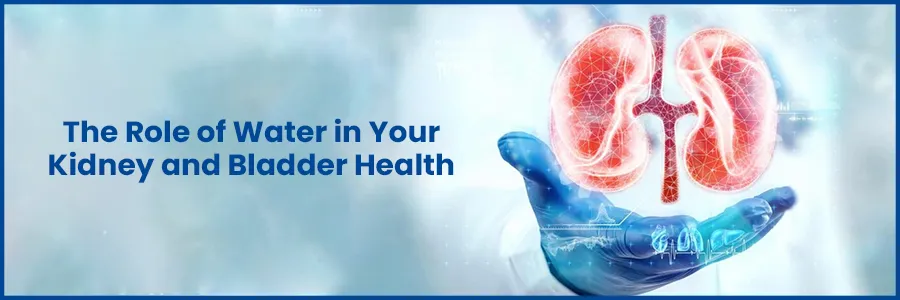
Importance of Water for a Healthy Bladder
Water is crucial for the health of almost every system in our bodies, but its significance is particularly pronounced when we consider the health of the kidneys and bladder. These organs are directly involved in fluid management, detoxification, and waste elimination. Here’s why water is essential for the optimal functioning of the kidneys and bladder:
Natural Detoxification through the Kidneys
- Efficient Filtration : The kidneys filter the blood, removing waste products and excess substances, which are then excreted as urine. Consuming adequate water aids this filtration process, ensuring the smooth removal of waste from the body.
- Balances Electrolytes : The kidneys are responsible for regulating and balancing essential minerals in our body, such as sodium, potassium, and calcium. Sufficient water intake ensures these minerals are adequately balanced, maintaining various bodily functions.
Prevention of Kidney Stones
Kidney stones form when there's a high concentration of specific minerals in the urine. Drinking plenty of water dilutes the presence of these minerals, reducing the risk of stones crystallizing and forming. If you have a history of kidney stones, hydration becomes even more vital.
Secure your health with a second opinion. Make informed decisions and book your appointment today!
Get A Second OpinionAiding the Bladder in Efficient Waste Elimination
- Regular Emptying : The bladder holds urine until it’s ready to be eliminated. Drinking water ensures the regular emptying of the bladder, preventing the stagnation of urine which could potentially lead to infections.
- Reducing Risk of UTIs : Urinary tract infections (UTIs) are often caused by bacteria that enter the urinary system. Regular urination, encouraged by drinking adequate water, flushes the system, helping to reduce the risk of infections. This process ensures that bacteria don't have the chance to settle and multiply.
Maintaining Urine Concentration
Adequate water consumption ensures that the urine is not too concentrated. Concentrated, dark urine can be an indication of dehydration and may irritate the inner lining of the bladder, potentially leading to bladder infections or other complications.
Promoting Blood Flow to the Kidneys
Hydration ensures efficient blood flow throughout the body. The kidneys, being responsible for filtering blood, require consistent and effective blood flow to function optimally. Dehydration can hamper this flow, affecting the kidneys' functionality.
Conclusion
Water's role in the functioning and health of the kidneys and bladder is both direct and essential. It aids in the filtration and elimination processes, ensuring our body can detoxify naturally and efficiently. For the sake of our kidneys, bladder, and overall health, maintaining proper hydration is of paramount importance. Always ensure you're consuming an adequate amount of fluids daily, adjusting for factors such as climate, physical activity, and individual health conditions.
Our urologist at Medicover Hospitals, frequently encounters patients who underestimate the vital role water plays in maintaining the health of their urinary system.
At Medicover, our advanced Urology department is equipped with state-of-the-art technology and a team of dedicated professionals committed to your urinary health. We understand the intricate details of the urinary system and offer a comprehensive range of services, from diagnostics to complex surgeries. Our holistic approach ensures that while we use the latest in medical advancements, we also emphasize the importance of natural preventive measures, like drinking enough water.
Stay hydrated, prioritize your urinary health, and remember, we at Medicover Hospitals are always here to assist you in your healthcare journey.
Ready to take control of your health journey? Book your appointment now and start your path towards wellness today!
Book an AppointmentFrequently Asked Questions
Water aids the kidneys in filtering toxins, waste products, and excess substances from the bloodstream. Sufficient water intake ensures efficient waste elimination and helps maintain electrolyte balance..
By consuming adequate water, urine's concentration of minerals such as calcium and uric acid is reduced. Diluted urine decreases the likelihood of these minerals crystallizing and forming kidney stones..
Consistent water intake ensures regular flushing of the bladder. This reduces the risk of urinary tract infections, prevents urine stagnation, and minimizes potential bladder infections..
Proper hydration results in lighter, clearer urine, indicating diluted waste products. Dark, concentrated urine can suggest dehydration and may irritate the bladder's inner lining..
While water alone cannot treat UTIs, it aids in the prevention by promoting frequent urination. This process flushes bacteria from the urinary system, reducing infection risk..
While the common recommendation is eight 8-ounce glasses daily (the "8x8 rule"), individual needs vary based on age, activity level, climate, and overall health. It's crucial to listen to your body and consult with healthcare professionals for personalized advice..
While many fluids can contribute to overall hydration, water is the most straightforward and effective choice. Beverages like tea or milk can also hydrate, but it's best to limit caffeinated or sugary drinks that might act as diuretics..
Chronic dehydration can lead to recurrent kidney stones, UTIs, and other urinary complications. Over time, reduced water intake might increase the risk of chronic kidney diseases or bladder infections..

Categories
- Cardiology 84
- Dermatology 45
- Endocrinology 33
- ENT 16
- Fertility 190
- Gastroenterology 78
- General-Medicine 81
- General 6
- Gynecology 80
- Hematology 19
- Infectious-Diseases 33
- Neurology 52
- Oncology 34
- Ophthalmology 23
- Orthopedics 69
- Pediatrics 31
- Procedure 23
- Public-Health 144
- Pulmonology 59
- Radiology 8
- Urology 68
- Wellness 161
- Woman-and-child 77